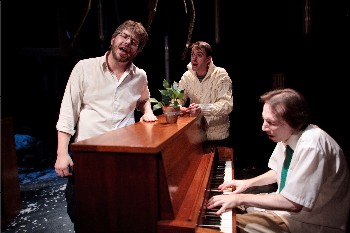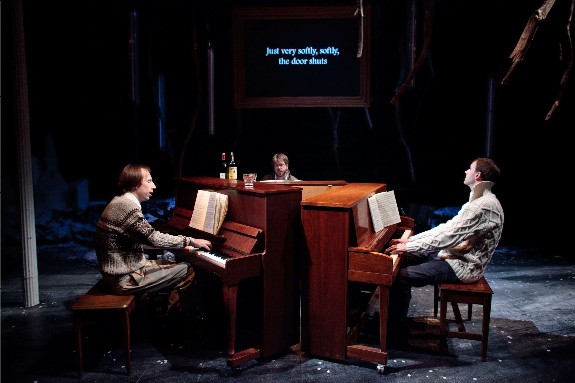Theater Review: The Irreverent Passion of “Three Pianos”
In Three Pianos, three young actor-musicians unite in their irreverent passion for the music of Franz Schubert.
Three Pianos. Written and performed by Rick Burkhard, Alec Duffy, and Dave Malloy. Directed by Rachel Chavkin. Presented by the American Repertory Theater, Cambridge, MA, through January 8, 2012.
By Peter-Adrian Cohen
The outcome of this review was, in large part, determined by geography. I was trying to find my way back from Jamaica Plain. Unfortunately there is NO way back from Jamaica Plain—no sane way at any rate. So I was 20 minutes late for the show. Now since I expect absolute devotion to their craft by theater artists, I need, perforce, demand the same of the reviewer. The following night, therefore, I went to see the show again. And the second viewing pretty much changed my mind.
What, on the first evening, seemed a trifle, annoyingly irresolute, on the second evening became enormously charming. Refreshingly relaxed in a world—that of professional theater—that generally leaves nothing, not even chance, to chance.
Against my will, almost, what had annoyed me the evening before I now saw as refreshingly irreverent. Dave Malloy, one of the show’s three writers and performers, describes how the play came to be: “I attended a concert at Judson Memorial Church (in lower Manhattan) . . . after the performance there was a party in the church . . . There was whiskey, wine, beer and a grand piano, so it quickly turned into this raucous party . . .” Which is when this same Malloy stumbled onto Schubert’s song-cycle Winterreise—the sheet music for which was laid out to dry in the choir loft. And thus was conceived, amidst song, whiskey, and spoiled sheet-music, Three Pianos. I have gone into all the background detail for a reason: Because it pretty accurately describes what you get when you go to see Three Pianos.
What is it then that makes for the evening’s charm? The play itself? Daringly, boldly constructed? Full of wit and surprising repartees?
The opposite. If anything, the form of the show seems intentionally pedestrian and artless: Song follows song until all—or most—are done.
Or is it the acting? The actor’s way with words? Let me put it this way: Enthusiasm and sheer energy trump enunciation and pronunciation.
Then it must have been the music? If you mean Franz Schubert’s (1797–1828), than negative. The show’s creators have boldly transposed Die Winterreis into a contemporary style, and the transformation makes the music a new pleasure to hear.
Well, if it’s not Schubert, surely it must be that the three creators of the show—Rick Burkhardt, Alec Duffy, and Malloy—are brilliant musicians? The difficulty with that is that the moments of music—luckily there are many—are so brief that you can only make an educated guess; mine is that these are really accomplished musicians. For sure their close harmony singing is an added bonus and a pleasure to listen to—as in the song Der Lindenbaum (the Linden Tree) or Letzte Hoffnung (Last Hope). What you also get, by the way, is an inventive, tongue-in-cheek history of classical music: a narrative that can’t help but make you smile.
Is it the director’s magic then? Not from what I could see. Since this is NOT an evening about subtlety and nuance, and certainly not about dramatic reversals, Rachel Chavkin’s job must have been fiendishly difficult. (If I may, the constant re-positioning, on stage, of the three pianos is a distraction.)
Is it the overall aesthetic then? The visual beauty of the thing? Clearly not: Three beat-up, upright pianos must do. There is a model of a small, Austrian village that looks suspiciously like Vermont, complete with tombstones that definitely were USA. To the creators’ credit, this show asks you to check all pretense, all learned whisperings about classical music, at the door and to abandon yourself to the memories of when you yourself were in your 20s and 30s and the world was an often hilarious and, at times, cruel joke.
What is it then about Three Pianos that made me revise almost everything I had written the night before? Perhaps this: the production furnishes invigorating proof that, given the right cast and skills, the whole by far exceeds the sum of its parts. (Which speaks well of the show’s director). This evening makes no claims to be anything other than what it is: a great party by and with three actor/musicians united in their love—or should I say passion—for the music of Franz Schubert.
The evening gives you a clear choice: Take it or leave it.
I suggest you take it.
Tagged: Alec Duffy, American Repertory Theater, Dave Malloy, Rick Burkhard, art


